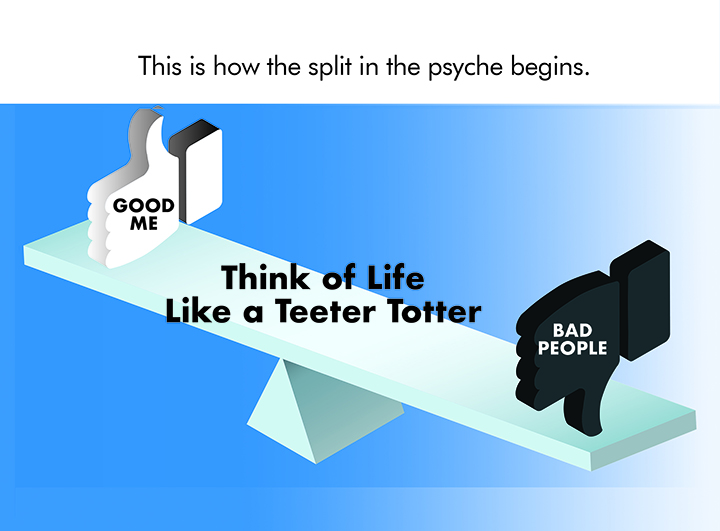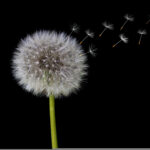Reflection Upon Our Emotional Experiences with Others Promotes Wholeness
Carl Jung showed us the way to becoming conscious of who we are and even more important, where we are out of balance with ourselves. He says,
“Closer examination of the dark characteristics — that is the inferiorities constituting the shadow — reveals that they have an emotional nature, a kind of autonomy, and accordingly an obsessive or, better, possessive quality. Emotion, incidentally, is not an activity of the individual but something that happens to him. Affects occur usually where adaptation is weakest, and at the same time they reveal the reason for its weakness, namely a certain degree of inferiority and the existence of a lower level of personality.”
—Carl G. Jung, AION: Researches Into The Phenomenology of the Self, paragraph 15
People say to me, “I know my shadow, or I’m already done with that.” Well, no, you’re not. No one is. What we do know about ourselves is only what our ego is able to tolerate, and our vast unconscious holds much more than we can assimilate. Our ego’s job is to survive with as little pain as possible so it is self-protective; and unless we have a strong enough ego, we will not be able to look at ourselves honestly.
“The shadow is a moral problem that challenges the whole ego-personality, for no one can become conscious of the shadow without considerable moral effort. To become conscious of it involves recognizing the dark aspects of the personality as present and real. This act is the essential condition for any kind of self-knowledge, and it therefore, as a rule, meets with considerable resistance. Indeed, self-knowledge as a psychotherapeutic measure frequently requires much painstaking work extending over a long period of time.”
—Carl G. Jung, AION: Researches Into The Phenomenology of the Self, paragraph 14
As part of our initial ego development, we each seek to embody a certain image of what we want to be and all the characteristics that could have become part of our conscious personality that we rejected early on constitute our shadow. As long as we continue to deny our shadow traits, they will remain in the unconscious, and therefore will have a more distorted or primitive expression than if we were conscious of them. Our shadow characteristics are often infantile, mainly because they are undeveloped.
Think of Life Like a Teeter Totter
As we’re growing up, we split ourselves in half. One side of the teeter totter has all the acceptable traits that we can identify with (both + and -), and the other side of the teeter totter holds all of the exact opposite traits. Yes, there is a paradox in life. Everything in the Universe is in opposites. Up/down, black/white, hot/cold, happy/sad, loud/quiet, selfish/unselfish, etc. I have said this in a previous issue, but I am going to repeat it because it is important: the biggest and first hurdle is to recognize that there are people inside us that we do not know.
As we are growing up, the good girl or boy was told to be good, and all the bad people are over there on the other side of the teeter totter. This is how the split in our psyche begins. Naturally, we all want acceptance and approval, so we tell ourselves, “I have to be good all the time,” and we try to live up to our values of idealism. Only now we are setting ourselves up for an US against THEM dichotomy. Unbeknownst to us, what we are doing is throwing down into our own unconscious all the parts of us that we, or anyone who has authority over us, decide are bad. The problem is rules for acceptability are arbitrary as they differ from family to family and even from culture to culture. Although ego and shadow are usually in stark contrast to each other, it’s good to remember that our shadow is not necessarily evil, but only perceived this way by our parents, our environment, our teachers, any authority figures we had growing up — even our peers, therefore it was repressed. And again, shadow is not about our negative characteristics. We all know only too well our faults, but faults do not constitute our shadow. Our shadow is completely unconscious and hidden from our awareness.
The natural gradient in the psyche is towards wholeness and consciousness. In order to get our attention when we are becoming lop-sided in any characteristic or trait, our shadow is going to act out compulsively behind our own back. Have you ever said something and then asked yourself, “Did I really say that? What got into me?” We can then feel humiliated and embarrassed because we sounded like an irate teenager. Compulsion is a psychological phenomenon of the life experience. It feels like we are out of control, and we are. A week or two will go by and we’ll forget what happened for a time, but, like anything repressed or denied, the same behavior will be triggered again and again because it wants to be known. Our shadow will startle us and embarrass us even if we said to ourselves, “I will never do that again.” In his book The Undiscovered Self, Jung says,
“Since it is universally believed that man is merely what his consciousness knows of itself, he regards himself as harmless and so adds stupidity to inequity. He does not deny that terrible things have happened and still go on happening, but it is always ‘the others’ who do them. And when such deeds belong to the recent or remote past, they quickly and conveniently sink into the sea of forgetfulness, and that state of chronic wooly-mindedness returns which we describe as ‘normality.’”
Some parts of us are easily recognized and some take much longer if they are ever realized at all. The unconscious (the Self, God within, Jung preferred the term the Imago Dei) will generously bring to us repeating patterns until we start to question ourselves and realize, this has happened to me before. What does my unconscious want from me now from this experience? It is only reflection and journaling that can keep us in dialogue with our unconscious who is consistently with us all the way, supporting us to evolve emotionally, psychologically, and spiritually.
Emotional Outbursts Trigger Our Complexes
The shadow is itself a complex of energy, a split-off part of the psyche that has remained autonomous. A complex is formed when something happens to us in our childhood — an emotional trauma, an illness, physical abuse, or abandonment which was an emotional shock to our system. This experience will have a lot of emotional energy formed around it, thereby becoming a complex that our ego cannot absorb into consciousness. Jung says complexes can also be formed by “a moral conflict that derives from the apparent impossibility of affirming the whole of one’s nature.” Therefore, our complexes behave like splinter personalities and will act as if they have a life of their own. One way to realize we are caught in a shadow complex is that it will show up in irrational outbursts of emotion that will bewilder us. Why is this bothering me so much? is a good question to ask ourselves.
Edward C. Whitmont in his book, The Symbolic Quest, says,
It is the emotional coloring that will tell us whether or not we are caught in a projection. Since a projection is always the visualization of a complex, it makes itself felt by a strong affect charge. In plain English, whenever a projection is involved, it “gets” us, it “gets under our skin.” Our reaction is affect-determined and we are therefore unable to react adequately to a person or situation; we can neither accept nor modify nor leave that person or situation. This is one of the few basic laws of the psyche which is, without exception, one hundred percent foolproof. As a rule of thumb, when such an uncomfortable situation occurs, when somebody really “gets under your skin” and you want to know what “gets” you in the other person. Say: “He is a dogmatic authoritarian (as aggressive as a bulldozer, or an opinionated old bat…) and I can’t stand that!” Then take out the “He is” and put in an “I am” or “My complex is like” and you will have a description of the complex at work.”
The theory of opposites is that whatever characteristic or quality we are highly identified with, the exact opposite is in our unconscious to the same degree. When I was teaching workshops, I had a woman say to me, “I think I am a very loving person and I think the opposite of that would be hateful. I think everyone should be loving and caring.” What I said to her was, “If you are being loving and caring all the time, then you are stuffing a lot of your real feelings and hiding your true emotional reactions from people. No one can be authentic and be loving and caring all the time and be true to themselves. Stuff happens that wasn’t fair to you. What do you do with that?” Many people get in relationships where they will do exactly what their partner wants all the time, thinking that this is how to keep the peace. It’s a false peace which will erupt sooner or later because the psyche is striving to be whole and complete. In Modern Man in Search of a Soul, Jung says,
“…nothing is more unbearable than a tepid harmony in personal relationships brought about by withholding emotions.”
In the Tavistock lectures, he explains,
“You see there is perfect harmony here; but do not make the mistake of thinking that this harmony is a paradise, for these people will kick against each other after awhile because they are just too harmonious.”
If we are in a long-term, committed relationship with a partner or a friend, they are going to notice things about us. We will bump up against each other’s humanity. It’s inevitable, as no one can go around for too long being totally wonderful every single minute of every day. As the saying goes, we all wake up on the wrong side of the bed sometimes. We all say dumb things or make childish mistakes. These are called faux pas.
If we are hurting ourselves by not knowing something about our own behavior, we hope our close friends will say something to us. When we cut them off from being honest with us, we are shooting ourselves in the foot, because we need friends who care enough about us to be honest with us. This is a true friend. Of course, it all greatly depends on how they say it. If that friend is being emotionally abusive by pointing out everything that they see is wrong with you and is harshly condemning and shaming you, then it’s likely also part of their own shadow that they may be seeing in you. In this case, it would be more like what Jung called “shadow boxing.”
So, if there is someone we despise, that we loathe and we become highly charged in our description of them, it is of course that part of us we refuse to face. This is not easy to do as our emotionally toned defensiveness will be intense. To get serious about doing “Shadow Work,” we have to take responsibility for situations like this that come into our life when we feel a huge surge of emotion taking over and possessing us. Notice the changes taking place in your body. Your blood will boil; your hair on your arms raises; your stomach turns. You can physically feel it in your body. You will feel completely REPULSED.
More Ways to See Our Shadow
Another way to see a shadow quality in us is in people we avoid. We walk around the room if we encounter them or we will ghost them. Ghosting them means that even if this person reaches out to us to initiate contact, they’re met with complete silence. Or when we ourselves start screaming at someone or someone starts shrieking at us, often this too is a shadow quality coming out. We will feel as if whoever they are is totally against our principles, moral values and ideals, so we’ll feel justified in our reaction.
We can also sound as if we are possessed when describing someone who is carrying our shadow for us. Our voice often changes pitch, and we tend to use highly charged adjectives to describe their behavior. If we catch ourselves going on and on about someone and we call this person and the next one. We can’t stop talking about it because we have a huge emotional charge. This is a real clue that another shadow trait is again making its way into the forefront, trying to get your attention. It’s a good idea to get to know this person as they are likely carrying (through projection) a part of your own psyche. To paraphrase Shakespeare, “Me thinks thou doth protest too much!”
We all have too much we feel guilty about, too much we don’t want to remember or look at, weaknesses we would rather avoid. Consequently, we ignore these circumstances and pretend they don’t exist. Until another individual synchronistically shows up in our everyday life, bringing into focus some of those characteristics we have tried to avoid seeing in ourselves. Because everything and everyone is energy and because they will have similar energy to our own, we will continue to draw these individuals or circumstances to us. In the book, The Inner Planets by Astrologers Howard Sasportas and Liz Greene who is also a Jungian analyst, Howard Sasportas says,
“You want a formula. I’ll give you a formula. First, you must not think that you are a terrible person because you feel nasty things like rage. We are human, and by virtue of being human, we all have some degree of lust, rage, envy, greed, and so on inside us. Many people are more than happy to deny what they believe are primitive or uncivilized instincts and emotions, but how can you transform something if you deny it even exists? Accept these states as part of your human inheritance and stop thinking you are horrid and unworthy for entertaining such feelings. It is psychologically clumsy to try to transform anything you are condemning. If you start by recognizing and accepting the existence of these states within you, the groundwork is then laid for dealing with them.”
When we blame others and see every problem as being only in them, then we are back to square one and then we have to start all over again because the unconscious is relentless in its ability to bring us the same situation over and over. This is painful because we will have to acknowledge our own capacity for whatever it is we find so reprehensible in them and that is exceedingly difficult for our ego. Think about it — you’re asking me to look at these difficult and challenging people as MIRRORS FOR ME? Yes. Despite this uncomfortable fact, take comfort in the understanding that we needed this particular mirror to achieve wholeness. The Self in us is orchestrating all of these events, situations and people whenever we are unwilling to see our own blind spots and create balance for ourselves. My teacher, Episcopalian priest and Jungian Analyst, J. Pittman McGehee, D.D. once said, “How many times does something have to happen to you for something to occur to you?”
When you hear negative mind talk that shifts you into judgment, ask yourself, “what am I judging here; what am I not willing to embrace; what is the opposite that could very well be in my unconscious?” Take any personal characteristic. For example: You see others as selfish and greedy while mentally contrasting yourself as selfless and giving, or you encourage others to become dependent on you only to end up resenting it. We do these things unconsciously to ourselves.
In Meeting the Shadow, which is a compilation of essays, Ken Wilber says, “Does it inform you about their behavior or does it affect you emotionally?” If it affects you emotionally, it is about you. These people are brought to us as a gift if we will look at them differently. We can’t change others, but we can change our own minds.
And doing Shadow work is not about getting rid of anything, it’s about including more. MORE OF YOU! I am this and I am that too. Embrace both sides for balance because the rejected qualities do not cease to exist simply because they have been denied direct expression. Instead, they live on within us and form this secondary personality that Jung calls our shadow.
Rebeca Eigen
Rebeca Eigen, an astrologer for 25+ years and author of The Shadow Dance & the Astrological 7th House Workbook specializes in relationships. From every day decisions, to critical life-altering moments, Rebeca shares with you her practical wisdom and guidance for your life’s journey in becoming who you are meant to be.
https://www.shadowdance.com/




